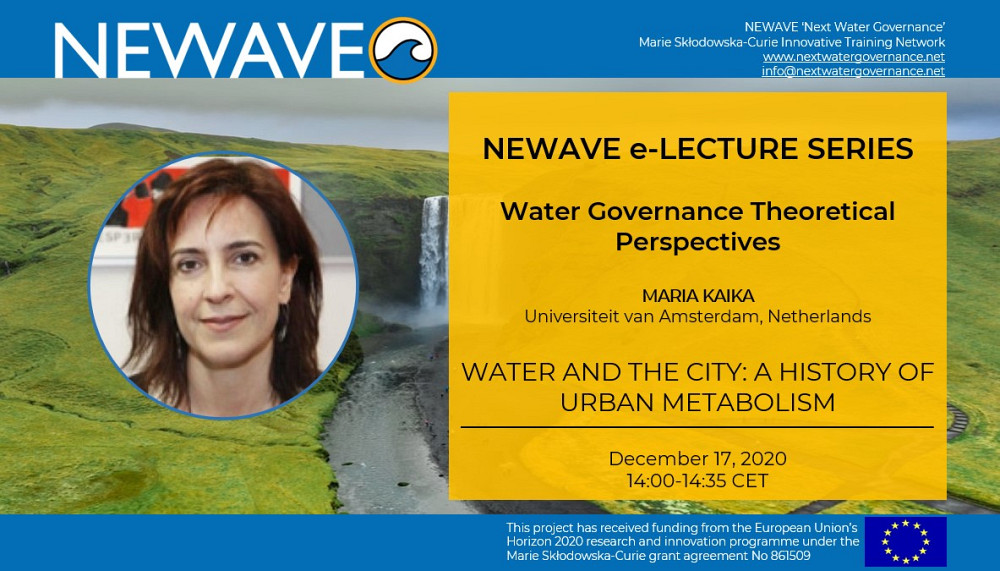NEWAVE e-Lecture Series: Water and the City: A history of urban metabolism | Prof. Maria Kaika
Water and the City: A history of urban metabolism
David Harvey notes that there is nothing unnatural about New York. Cities are the product of natural processes, human metabolism, human labor, capital investment and social relations of power. Water lies at the centre of urban metabolism. This lecture examines how the quest to conquer and dominate water resources played a primary role in the development of urban environments. From Bazalgette’s iconic sewage project that made London functional again after recurrent cholera epidemics, to Moussolini’s water-eating machines that turned Italy’s swamps into glistering new towns, we shall examine how, throughout modernity, practices of control and technologically advanced distribution networks (plumbing, sewage, flood control systems, etc.) were essential for sustaining the urbanization process. Without the control of the metabolic flows of water, cities could not have developed the way they have.
References:
Kaika, Maria. (2004). Interrogating the Geographies of the Familiar: Domesticating Nature and Constructing the Autonomy of the Modern Home. International Journal of Urban and Regional Research 28(2):265-86.
Kaika, Maria. (2017). Don’t call me Resilient Again! The New Urban Agenda as Immunology … or what happens when communities refuse to be vaccinated with ‘smart cities’ and indicators. Environment and Urbanization 29(1):89-102.
Kaika, Maria, and Erik Swyngedouw. (2000). Fetishising the Modern City: the Phantasmagoria of Urban Technological Networks. International Journal of Urban and Regional Research 24(1):120-38.
Kaika, Maria. (2006). Dams as symbols of modernization: the urbanization of nature between geographical imagination and materiality.Annals, Association of American Geographers 96(2):276-301.
Caprotti, Federico, and Maria Kaika. (2008). City and Nature: ideology and representation in fascist New Towns. Social and Cultural Geography 9 (6):613-34.
Prof. Maria Kaika
Maria Kaika holds a PhD from Oxford University, and an MA in Architecture and Planning from the National Technical University of Athens. She is Fellow of the Netherlands Institute for Advanced Study in the Humanities and Social Sciences (2019/20), and Chair in Urban Regional and Environmental Planning, at the University of Amsterdam. She has taught at the Universities of Oxford (tenured), Manchester (tenured) Paris Est (LATTS), KULeuven, University of London and TU Vienna. Her international academic roles include: panel member of the European Research Council (ERC SH2), high level foreign expert of the Belgian Science Policy Office in Humanities, Chief co-Editor of the International Journal of Urban and Regional Research. (2010-2017), elected Professor of the City of Vienna (2013). Her research focuses on three interrelated themes: urban political ecology, cities crisis and land financialization, and urban radical imaginaries. She has been awarded funding from national and international research councils including the British Academy, EU Frameworks, and Marie Curie ITN. Maria Kaika is author of many academic articles and books including: City of Flows: Modernity, Nature and the City (2005; Routledge, New York) In the Nature of Cities: urban political ecology and the metabolism of urban environments (2006; Routledge, London with N Heynen and E Swyngedouw) The political ecology of Austerity (2020 Routledge London, with R Calvario and G Velegrakis).
About the e-Lecture Series:
This online training module has the objective to engage the NEWAVESRs and the audience in different water governance perspectives. All lectures are open to the public upon registration.
Please register here
A participation certificate can be requested if attending at least 80% of the online public talks.
*All times are in CET (UTC+1)
We would love to know what you think! Please leave a comment below and engage in our online discussion group.




